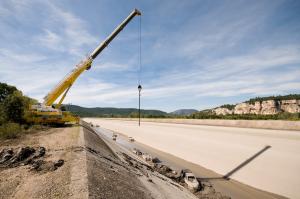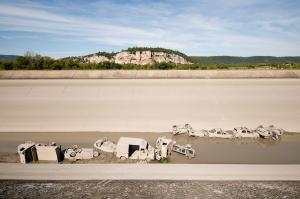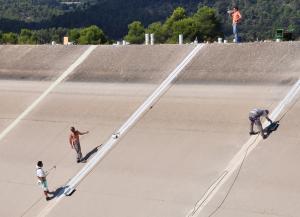Canal clean-up exposes sludge-coated Auto Show
24 Sep 2010
-
Robert Arnoux
Once every ten years, more or less, the Canal Authority launches a large cleaning operation aimed at ridding the canal of all the junk that has accumulated over the years. © Benjamin Mille
Like a vital artery, the 250-kilometre long Canal de Provence supplies the region's inhabitants with some of the basic necessities of life: energy (20 percent of the region's needs) and irrigation, as well as drinking water.
It will also supply ITER with some 1.7 million cubic metres of cooling water per year—an impressive figure, but one which accounts for only 0.25 percent of the canal's annual flow.
Preventing clogging in the canal is as important as preventing it in arteries ...
Once every ten years, more or less, the Canal Authority launches a large cleaning operation aimed at ridding the canal of all the junk that has accumulated over the years.
The operation, which requires almost two years of preparation and planning, is also an opportunity to check the concrete walls for leaks, to fix them, and to perform maintenance on the hydroelectric equipment.
A near decade of car dumping makes for a lot of junk; one week into the job on the Cadarache-Jouques section, some 70 cars had already been retrieved. © Benjamin Mille
The works, which are visible to all those who commute between Aix and ITER or drive over the Mirabeau Bridge, are presently ongoing on a nine-kilometre section of the Canal, between Cadarache and the Jouques hydroelectric plant.
The operation, which began on Monday 13 September and will last for a whole month, is a delicate one: the delivery of water cannot be interrupted and a complex system of pumping and by-passes has to be implemented.
The canal's "cholesterol" is a very special one: it is mainly made of junked vehicles that, for various reasons (predominantly insurance scams) have been dumped into it.
Workers rappel up and down the canal's steep walls in order to fill the cracks with waterproof coating.
A near decade of car dumping makes for a lot of junk; last time the canal was cleaned, in 2002, some 300 vehicles were lifted from its bed. One week into the job on the Cadarache-Jouques section, some 70 cars—including luxury SUVs and small vans—had already been retrieved.
Standing on the embankment last week, the view was particularly striking: while workers rappelled up and down the canal's steep walls in order to fill the cracks with waterproof coating, cranes kept hauling out sand-coloured vehicles that looked like something out of the battle of El Alamein.
Indeed, the bottom of the canal looked like a deserted WWII North-African battlefield or, to some, like a daring installation in a Contemporary Art gallery.
Special thanks to Benjamin Mille for kindly providing the illustrations.




